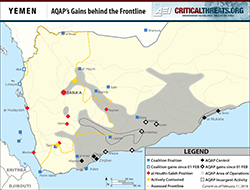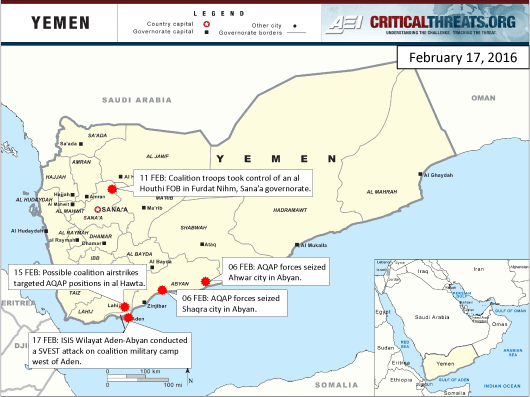The Islamic State of Iraq and al Sham (ISIS) in Yemen is undermining the internationally-recognized government in Aden through repeated, effective attacks on security forces and government officials. The Saudi-led coalition may now have targeted al Qaeda in the Arabian Peninsula (AQAP) and other Salafi-jihadi militant groups because they pose a direct threat to Aden’s security, though the coalition's main effort remains against the al Houthi-Saleh alliance.
ISIS Wilayat Aden-Abyan continues to conduct attacks in Aden to disrupt the re-establishment of a viable government. It claimed responsibility for the February 17 suicide bombing attack on a military camp west of Aden city. (Translation available by subscription through SITE.) The attack reportedly killed 20 soldiers and wounded 60 more, the most deadly attack in Aden in 2016. ISIS in Yemen seeks to generate asymmetrical effects that could derail efforts to establish a legitimate, recognized government in Aden through a series of attacks against Abdu Rabbu Mansour Hadi's government and possibly against coalition targets as well.
Local armed militant groups threaten Aden’s long-term stability. Many of these groups fought against the al Houthi-Saleh alliance, but are also against the Hadi government. Armed southern secessionists remain active in the city. Attacks in Aden have escalated from assassinations of public officials to outright clashes between pro-Hadi forces and local militants. Gunmen attempted to assassinate Aden’s governor Aidaroos al Zubairi on February 16, the second such attempt on his life. Security forces clashed with militants in Aden’s al Mansoura district on February 9 and 10, with air support provided by the coalition. Gunmen also killed three soldiers on February 11 and killed five others in an attack on a police station on February 12.
 AQAP is consolidating control in areas that once constituted its emirate in 2011-2012. AQAP seized the towns of Shaqra and Ahwar in Abyan governorate on February 6, extending its control along Yemen’s two primary roads connecting al Mukalla to central and southern Yemen. AQAP has taken control of five major population centers since February 1. The death of Jalal Bal’idi al Marqishi, the commander of AQAP’s insurgent arm, Ansar al Sharia, has sparked internal controversy over the appointment of his successor, though the division does not appear to have had a significant impact on AQAP's strength in Abyan.
AQAP is consolidating control in areas that once constituted its emirate in 2011-2012. AQAP seized the towns of Shaqra and Ahwar in Abyan governorate on February 6, extending its control along Yemen’s two primary roads connecting al Mukalla to central and southern Yemen. AQAP has taken control of five major population centers since February 1. The death of Jalal Bal’idi al Marqishi, the commander of AQAP’s insurgent arm, Ansar al Sharia, has sparked internal controversy over the appointment of his successor, though the division does not appear to have had a significant impact on AQAP's strength in Abyan.
The coalition may have conducted airstrikes targeting AQAP in Lahij and Abyan governorates. The coalition targeted AQAP positions surrounding Aden city, reportedly conducting airstrikes on AQAP positions in Lahij, several miles north of Aden on February 15, and conducted Apache helicopter airstrikes on Jaar on February 16. The coalition has prioritized its campaign against the al Houthi-Saleh alliance and rebuilding governance in Aden. It is likely that the recent airstrikes only will focus on direct threats to Aden’s stability, and will refrain from engaging with AQAP and ISIS on other fronts. The coalition reportedly deployed special forces to al Mukalla, AQAP’s de facto capital, on February 16, as well as al Hudaydah and Midi port.
The coalition continues to make tactical advances against the al Houthi-Saleh alliance in Sana’a governorate. Coalition-backed forces took control of Furdat Nihm, an al Houthi forward operating base (FOB) northeast of Sana’a city on February 11 after a week of intense fighting. Ground progress toward Sana’a may increase pressure on the al Houthi-Saleh forces, though the anti-al Houthi coalition may not receive a buoy of support in areas that historically may have supported the coalition because of the flight of local powerbrokers. The coalition has increased airstrikes and deployed troops to the frontlines near Furdat Nihm.
The coalition will continue to prioritize its efforts against the al Houthi-Saleh alliance over combating AQAP and ISIS. The coalition will possibly conduct attacks against AQAP and ISIS in order to advance its objective of securing Aden and establishing Hadi's government in Yemen.

